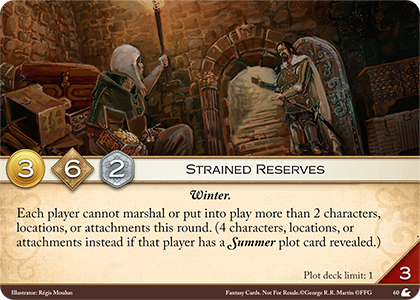Rules FAQ
-
The number 2 (or 4 if you have a Summer plot) is for all cardtypes combined.
-
Marshaling or putting a card into play as a duplicate does not count towards your limit. However, if you have already reached your limit, you can no longer attempt to marshal or put cards into play, even if they would enter play as a duplicate. So make sure you marshal your duplicates first.
-
You can freely marshal cards into shadows, since the cards you marshal into shadows have no cardtype. But you are limited by the plot if you want to bring cards out of shadows.
-
A character, location or attachment is "put into play" any time it enters play without being marshaled in the marshaling phase. That includes ambush, shadows, and various card abilities (like Freedmen, for instance). The only exception is cards returning to play when an effect that removed them from the game expires (for instance, if Coldhands leaves play). Such cards do not count towards your limit and are not blocked by Strained Reserves.
-
If an event card enters play as an attachment, you are considered to have put an attachment into play. So playing Risen from the Sea will count towards your limit (unless you save a character with no attachments). If you are already at your limit, you can still play those events, but they will fail to enter play as attachments.
-
If you put a card into play from an opponent's out-of-play area, it counts towards your limit, not your opponent's.
-
Strained Reserves might also block some forced abilities from resolving (for instance, A Mummer's Farce).
-
Strained Reserves will "remember" whether you have already marshaled or put into play any cards that round before it was revealed. On the other hand, if you reveal a new plot in the middle of the round, Strained Reserves no longer affects the game.
